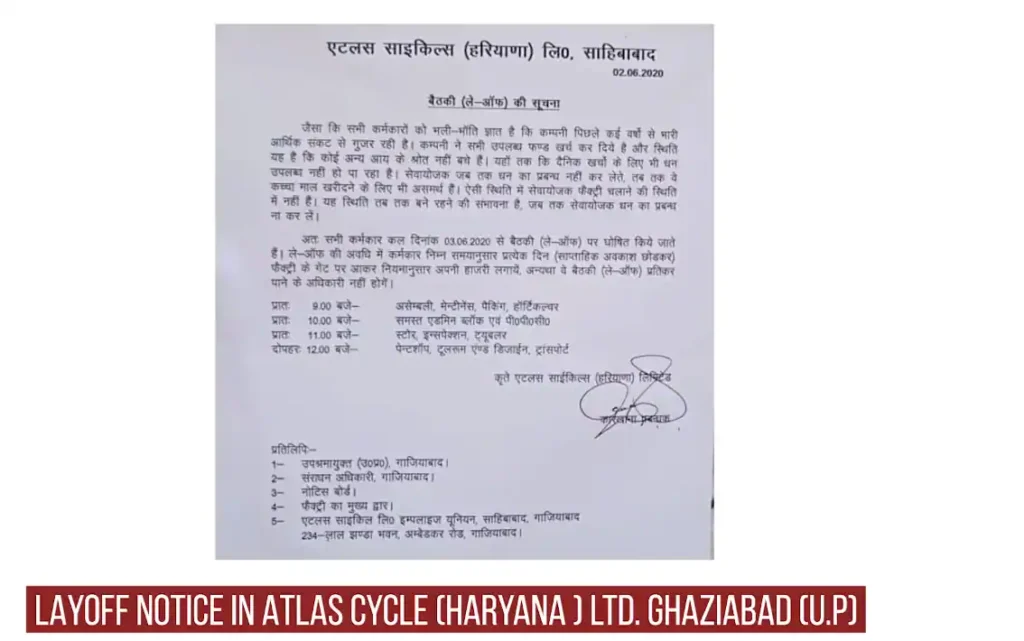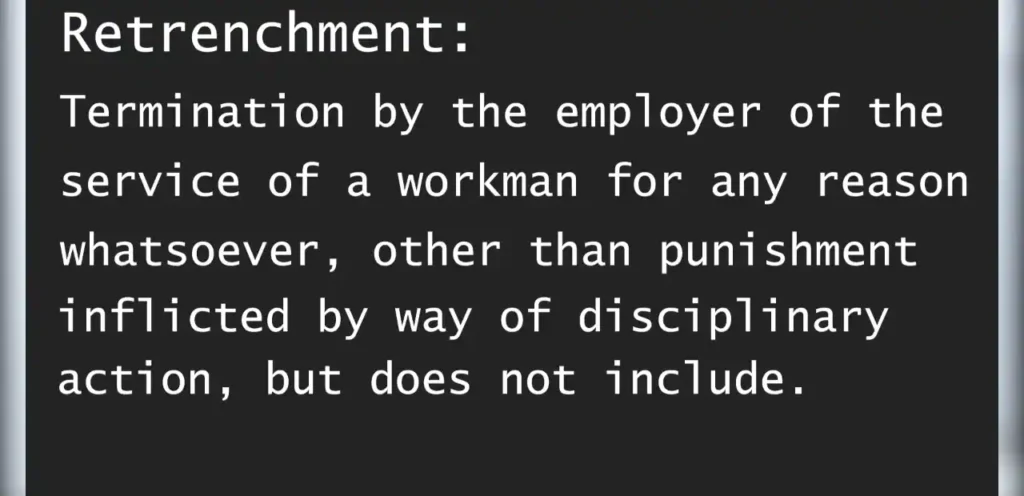Job Termination & Lay-Off Rules & Employee Rights: Can any employer terminate any of his employees whenever he wants? What is the correct procedure for termination? How much compensation has to be paid to the employee at the time of termination? What is the difference between termination and layoff? And what does the Industrial Dispute Act of 1947 Say About Termination?

So, friends, this is what we are going to cover in today’s article, We are going to cover the rules related to termination and layoff Regulations and a compensation And we will know a little bit about the basics of the Industrial Dispute Act Specifically, layoff and termination rules.
So, friends, Before we go any further a word that will be used again and again in this article that is workman So when it comes to the Industrial Dispute Act, the word employee is not used there.
There the word is used as a workman So let’s see the definition of workman Workman means any person including an apprentices employed in industry to do any manual, unskilled, skilled, technical, operational, clerical or supervisory work for hire or reward, whether the term of employment be expressed or implied,
so, it means, workman can be any person who is being hired by any industry Whether manual skilled, unskilled, Operational, Chemical, Supervisory for any type of job and its terms and conditions, of employment Whether it is written or spoken or told, whether expressed or implied All of them have been put in the category of workmen. but it has some exceptions #1, Army, Navy and Air Force, will not come under the category of this workman. #2, whatever the police or the staff associated with the prison, they will also not come.

3rd and 4th are very important for private employees #3 says that, those who employed in the menially managerial category That too will not come in the category of this workman. And the last exception it contains says Anyone who is employed in a supervisory capacity and wedges about Rs 10,000 So any supervisor that the company hired And his salary is also more than Rs 10,000 So he will also not be kept in the category of the workman.
So, it will be said in this, oh, this has become a big loophole. I run an IT company I have ten programmers and I call them all managers. So will they not come under the category of workman? No. So many decisions have been given on this matter in various high courts and the High Court has cleared when it comes to the workman, it will not be decided on its designation.
It is decided on what is his work/duties and it is seen that if he has actually a managerial duty He is managing 8 to 10 people under him such is his job profile then only he is called the manager. Merely writing manager in name or designation will not make a person a manager or supervisor.

So this is the definition of a workman, keep this in the back of the mind And in the Industrial Disputes Act, if I use the word employee, you have to consider this as the workman And what are the rules for those who are not workmen? We will understand that too at the end of this article.
So, first, let’s talk about the two words LAYOFF and TERMINAITON If we speak termination in legal language, So termination of employment is called, retrenchment We will talk about that too in a while in this article. The second word that comes is a layoff Most people mix up layoff and termination of employment both are totally different things.
So, first, we will talk about Layoff What is the legal definition of layoff and its rules as per the Industrial Dispute Act So the legal definition of layoff says that Failure to refuse and the inability of an employer to give employment to a workman, whose name is on the muster roll. Such a person, such an employee, such a workman whose name is in the register of the company, in the muster roll, tell them that we are not able to give you any job right now We don’t have the ability right now to give you work.
So it’s called layoff but it is not a termination Have not told that employee that we have fired you He has said that right now we are not able to give you work, So what could be the reason for that? Suppose there is a power plant Coal is not being supplied in the power plant yet, So if the coal is not coming then how will the power plant run? or a machine industry that makes cups, and there’s no electricity.
That’s why work is stopped due to the electricity Or suppose that paper is not coming in the same cup industry the raw material is not available so work is not being done due to this There can be multiple such reasons or natural calamity happened Like right now covid situation happened you can consider this a natural calamity
So even during this time if the company is not able to run due to any reason So at that time, the employee is told that, we are not able to give you new work due to all these reasons so we’re laying you off But there are many rules and regulations for layoff as well.
let’s understand that. For example, you saw just a few days ago that Atlas Cycles, a very famous company in our country, had also laid off its employees. so what are the rules and regulations for layoff? 1st is, layoff should be justified There are two words in this, bonafide and malafide. Maybe I’m not pronouncing it correctly But it is a legal word and will be used in many places.

Bona Fied means, in good faith and Mala Fied means, in bad intention / bad faith So the first rule should be, should be justified/bona fied It is not that only the company felt that now we can do our work with such percentage of employees. Let’s take the rest lay off for the time being It doesn’t happen like this its reason should be justified No.
Their muster roll should be maintained No 3, employees should be informed employees in the cloud Employees have to inform that when their companies will open back If the company is taking time to open If suppose an employee is working in Bombay(Mumbai) But his village is 100/200 and 500 km away from Mumbai During that time, whether the employee has to go to his home or not, this also has to be informed by the company.
If the company says that our layoff is for 2 days only don’t go home So the company can also say that come once a day and put a present here So the employer has to tell this time that At what time the employee will have to come and put his present in the company So that they can get whatever compensation is there for the layoff? Other than this, one more thing is, Let’s say layoff went too long up to 4 weeks, 5 weeks And during that time the employee was told to go to his home.
So the employee may have to get time to three weeks to come back. If your lay off is going on for a long time Then let’s talk about compensation So whatever is the basic + DA wages of the employee during a layoff pay attention whatever is the basic + DA wages of the employee during a layoff 50% of that has to be given But how much has to be given? Suppose lay-off is going on for 100 days, then 100 days are not to be given.
Up to 45 days in this, if the layoff lasts for 45 days So 50% of basic + DA will have to be given for 45 days. After that, giving this compensation is not compulsory As per the industrial dispute Act and the last rule says that, Suppose the condition of the company did not improve even after the layoff, Or the company is no longer in a position to hire Or the company does not have work and finally, the company is terminating the employee, and retrenching their service So in that case the compensation for whatever entrancement is made
It can be set off Against compensation of layoff for example, 20,000 in compensation given in layoffs The layoff compensation, 50% of basic + DA, was made of 20,000 And now after that, the company has to remove that employee And at this time the compensation of 1 lakh rupees is being made so, Rs 20,000 already given Now the company will have to pay only Rs 80,000 The remaining 20,000 rupees can be set off.
Against this retrenchment compensation So I hope lay off will be clear to you, You won’t confuse Lay Off with Termination so, now let’s talk about What is Retrenchment? So entrancement is a legal term, let’s understand its definition entrancement means, Termination by the employer of the service of a workman for any reason Pay attention to the word, for any reason whatsoever, other than punishment inflicted by way of disciplinary action but does not include.

So here it is written that Termination means, stopping the service of an employee by the employer it will be called termination for any reason except, if disciplinary action has been taken Suppose a committee has been formed and action has been taken on it due to sexual harassment. service of an employee terminated because of that So you will not call the season a entrancement Service is terminated due to any other reason so it’s called entrancement.
There are some exceptions for example voluntary retirement or employee has been removed due to retirement age Other than that if there is a non-renewal of the contract An employee was hired for a particular project, Suppose a bridge is being built, for that, some employee was taken Or some foreign project has come up, Hired an employee for 18 months on contract for that And that your contract ends or the whole bridge becomes done So if the engineer has to be removed, he has to be removed.
keep one thing in mind if there is a job role that is running continuously suppose accountant The role of an accountant is constant in the company You cannot hire an employee on contract for that. That you kept for one year, then you are renewing the same employee again or not renewing. If in that case the contract of that employee is not being renewed, So this condition of entrancement will apply in that.
It is very clear in the decision of different High Courts And in this, the 4th season that comes, the employee’s ill health Service terminated due to persistent ill health so, that too will not be called retrenchment so, when can retrenchment be done? So many people have this confusion that If the Company is in huge loss then during that time retrenchment will done but I told you as per Act It is written in it for any reason so entrancement can happen due to any reason.
There are some common reasons, for example restructuring the business, Or right now our economy is not good or we are in loss, or we have lost a big client Such common reasons are considered valid in the court. Now, at the time of retrenchment, some employees have duties and some rules It is very important to follow these duties and these rules Otherwise, retrenchment is considered a null and void And the employee has to reinstate back So these rules should be understood carefully by both the employees and the employers.
First of all, it is very important to give a notice period of one month at the time of entrancement. If you are giving one month’s notice and during that time Want the employee to continue on the job then his salary will have to be given at that time And suppose you want that there is no problem, you leave the job Even then it is necessary to give the compensation/salary of that month to the employee.
Number 2, notice you are giving for one month It should have a clear date of termination Suppose you gave notice in February for the month of March And in that, you have to tell exactly We are giving you this notice till 31 March. for this particular 1 month. Apart from that, whenever you retrench an employee as employer,
So whatever the number of years of service of that employee was Suppose there have been 10 years of service then according to every year 15 days’ salary will have to be given in the form of retrenchment compensation so, if the service is for 10 years So according to 15 days total 115 days’ salary as retrenchment compensation will have to be given to that particular employee.
Then some rules have to be followed First of all, Rule 25D states that all employees are to be maintained in the muster roll and have to mention the exact date in it that the employee has been retrenched on this date. No 2, Rule 77 states that, it is a very interesting and important rule If you are planning to retrench employees in a particular department or designation So all the employees in that particular designation/department /category So you will have to put the list of all those employees seniority-wise on a notice board.
If this rule is not followed then then the retrenchment can be null-and-voided. After that, rule 25G states that, After making the list, you have to follow the rule of last in first out as employer i.e. suppose you are in a BPO in which 20 employees work on a particular designation The latest 5 employees in it and you need to retrench 5 employee So the latest 5 employees have to be retrenched first.

Then move on towards seniors Yes, the exception in this is, if any particular reason is there, So at that time if you are retrenched some employees without any reason So in that, you have to take care of the seniority But, if any particular reason is there Let’s say your new process is coming and which requires a particular software And that’s with the juniors and if it is not with any one particular senior So because of this reason, you can retrench a senior.
Otherwise, you must always follow the seniority order and in the last, rule 25F states that Even after doing entrancement, if you need to hire people again for that particular vacancy So first those who have been retrenched first, have to ask them whether they want to join our company again for this position.
And if they’re not taking that position Only then you can take a new employee The first right on that is will be of retrenched employees So whatever the duties and whatever the rules are if they are not followed So it can be contested in court And in many cases, the employees have been reinstated. Now let’s talk about such a very big company, in which more than a hundred people are there so, on more than 100 people, and in some states like Rajasthan and Madhya Pradesh on more than 300 people, the rules become more strict.
And these rules are not strict for all companies. It consists of three particular categories No 1, Factories No 2, Mines and No 3, Plantation That is the tea coffee plantations etc. So over there, as I told you about and the rules of layoff and retrenchment other than that, some rules are there For example in big industries/factories/companies at the time of doing layoff/retrenchment Taking approval from the government whichever is the appropriate government whether central/state, it is a must to take approval
For this, notice is first sent to the government that we want to layoff / retrench these employees And that thing can be done only after the approval of the government. Also the notice period in this, of retrenchment I told you above, it is of one month In this case, there is a notice period of three months.
Now let’s talk about all those employees who do not under the category of workman this means, the employees of managerial/ supervisory categories so, the overall binding factor for them is their contract. means, the employment contract or standing order the same will be considered as a binding And whatever rules and regulations are written in it what you got in the contract Based on them, the compensation that you will get be decided.
Yes, there is one thing to keep in mind that if the employer has made such a contract, which is entirely in favour of the employer and totally against of the employee so it would not stand in court for example, I made a article on a bond as I told you that bonds are made with such strange rules that doesn’t stand in court at all You can watch that article by going to the ‘i’ button.
Apart from this, we have to take care of one more thing not only this retrenchment compensation, many more things and many more benefits as employees you can get at a time of termination which have to be given by the employers So you should also pay attention to that. Gratuity comes first in that If you have more than five years of service then you are eligible for gratuity.

That is, according to the 15 days of the year You will get a gratuity for the number of years you have served. so, this you should keep in mind. No 2, Whatever earn leave is accumulated by you Leave encasement of all of them will also have to be given to the employee. and No 3, Bonus if the employee has worked for more than 30 days in that financial year So he is also eligible for the bonus.
The number of days the employee has worked Accordingly, after calculating the bonus, the bonus also has to be given to the employee. One more question comes, What is the difference between Retrenchment and Resignation? so, most of companies insist their employees that we do not want to terminate or fire you, give your registration.
Because I told you the rules of entrancement are very strict. Especially for those companies, in which, more than a hundred employees are there. So in this case the companies prefer that That the employee should give his resignation willingly, so that they don’t have to follow all these rules and regulations Because the employee can leave after giving his willing resignation, then the company do not have to pay retrenchment compensation to them So take care in this case, at the time of registration, the company may state that.
If you don’t give registration, we will do it legally against you. We will stop your benefit. Will do the full and final things If you are strong build and you want to fight So these things can be contested by the employee These wrong practices are done by many companies which you should understand. So if you stay aware then you will be able to contest these things And I want to share with you one absolutely genuine thing with your, friends For the past few days, I have received so many emails/ messages.
That our company fired us Nowadays people are being fired on WhatsApp call so many things are happening. And the employees are very depressed, very depressed in these conditions. My advice to you is, as an employee, if you are in any one industry you still have to care A secondary skill you must develop yourself a secondary skill, like So that you can also generate your new employment Or can make some income part-time Or it can become a source of business/consultancy for you.
Jai Hind! Jai Bharat!

